Jason Wang (王凱傑) had already lost in the season finale of the reality TV cooking show MasterChef when things, as he put it, went “bonkers” in Taiwan.
Late last year, an online clip of the 35-year-old Taiwanese-American music teacher and classical tenor vocalist made the rounds showing a dish he prepared for one of the show’s challenges. In it, contestants learn the ingredients only after lifting up a mystery box.
“I was just jumping for joy because it was all very, very expensive seafood and shellfish,” Wang told the Taipei Times during a recent phone interview.
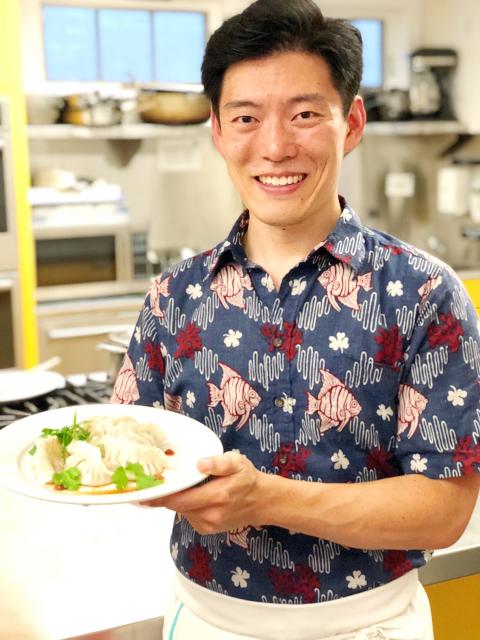
Photo courtesy of Jason Wang
Wang’s finished product, artistically plated, included shrimp, sea urchin roe wrapped in bok choy leaves and maitake mushroom (舞茸蘑菇), all of which were fried as a tempura.
But it was a clam soup — what Wang called an “elevated” gelitang (蛤蜊湯) — that won over the hearts of millions of Taiwanese who saw the video, not to mention his interaction with British celebrity chef Gordon Ramsay, one of the show’s judges known for his fiery temper and penchant for expletives.
“I kind of got choked up because when my parents came from Taiwan, they were grad students, they really didn’t have a lot of money,” Wang said. “So the types of ingredients that were here... were things that we had wanted to use but wouldn’t use because they were too expensive.”
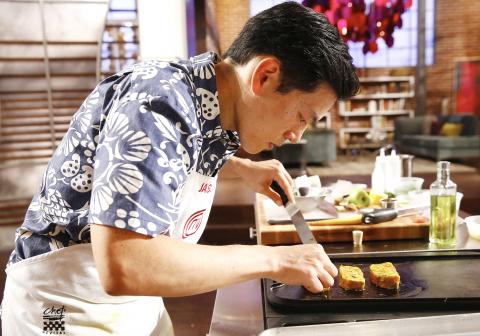
Photo courtesy of FOX
Wang emerged as the runner-up in the final episode of season eight of MasterChef, which ended in September in the US and was broadcast on Fox. But that hasn’t at all dimmed his rising celebrity in Taiwan, where both of his parents grew up.
Wang recently wrapped up a visit to the island that included a Q&A with fans, appearances on television and a press conference with local Chinese-language media.
CIRCUITOUS PATH TO COOKING
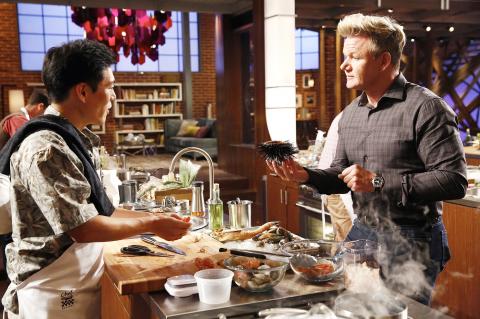
Photo courtesy of FOX
Wang was an accidental chef and never envisioned himself as a success in the kitchen. His initial major in college was plant science. He dabbled in landscape architecture, hotel administration and eventually music, all in his junior year.
Wang ended up a music teacher, first in middle school, then at the Newton South High School in Massachusetts, where he has worked for the past four years, he said.
Food and a mission of spreading his love of it followed Wang all throughout his academic and professional career.
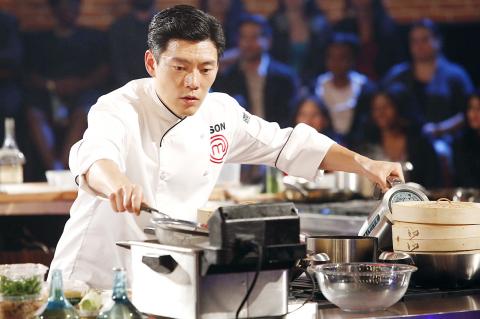
Photo courtesy of Greg Gayne and FOX
“Even in the classroom, when I’m doing music rehearsal, I’m always using food metaphors and using food descriptors,” he said.
A self-described big eater, Wang said he has always enjoyed food, having grown up around his grandparents who lived with his family for a time and who were often in the kitchen.
While they cooked Chinese food — Wang’s mother’s family is from Shanghai, his father’s from Beijing — the first dish Wang ever made, ironically enough, was an all American apple pie when he was 12 years old.
‘MASTERCHEF’
Things began to come full-circle for Wang after he learned of an open audition call in Boston for MasterChef in April 2016. His friends urged him to try out, he recalled.
After hesitating on the day of the audition, Wang joined the last group of 25, he said. The candidates entered a big ballroom and were given just three minutes to plate a dish they had brought with them, said Wang.
“I went there thinking that I’d just have an opportunity for someone, like an expert, to try my food,” Wang said. “I wasn’t necessarily thinking like, ‘Oh, I need to be on a TV show.’”
But following some interviews, ending up on a TV show is exactly what happened. Season eight of MasterChef began filming in Los Angeles in August 2016, and Wang was told to be prepared to stay for one week or as many as three months, he said.
Wang described Ramsay — the judge who fell in love with Wang’s clam soup, infectious smile and personality — as a “very imposing guy” with “very exacting standards.”
“Before even meeting him, I had a lot of respect for how seriously he took the art of cooking,” Wang said.
Since the season ended, Wang has surprised by the amount of attention he has received; his parents have been stupefied. But, at the same time, he said he understood the appeal of his now famous clam soup, and how praise from Ramsay put it on a “really visible international stage.”
“It’s a very iconic dish for a lot of Taiwanese folks, and it’s something very simple,” Wang said. “But it kind of sums up the whole Taiwan experience of being simple and delicious and pure and full of flavors.”
As for his future after MasterChef, Wang hasn’t ruled anything out. The educator in him said he has a sense of responsibility to share food knowledge with his audience. An Instagram account he started for the show and his Facebook page both have large followings.
“At the heart of it, I really want to make educating people my mission, regardless if it’s music or food,” he said.
Wang said his strong network of friends and family — including his mom, a nutritionist, and dad, a senior scientist at Philips — helps keep him grounded if things become too overwhelming.
This entire journey, Wang added, has also helped shape his identity as Taiwanese American.
“My parents came from Taiwan, and we grew up in New England, so I just felt like I was always me,” Wang said. “But I’ve realized now that I think because food connects people in such an intimate way that I am, in very many ways, super Taiwanese.”

Many people noticed the flood of pro-China propaganda across a number of venues in recent weeks that looks like a coordinated assault on US Taiwan policy. It does look like an effort intended to influence the US before the meeting between US President Donald Trump and Chinese dictator Xi Jinping (習近平) over the weekend. Jennifer Kavanagh’s piece in the New York Times in September appears to be the opening strike of the current campaign. She followed up last week in the Lowy Interpreter, blaming the US for causing the PRC to escalate in the Philippines and Taiwan, saying that as
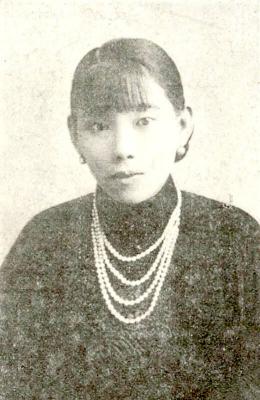
Nov. 3 to Nov. 9 In 1925, 18-year-old Huang Chin-chuan (黃金川) penned the following words: “When will the day of women’s equal rights arrive, so that my talents won’t drift away in the eastern stream?” These were the closing lines to her poem “Female Student” (女學生), which expressed her unwillingness to be confined to traditional female roles and her desire to study and explore the world. Born to a wealthy family on Nov. 5, 1907, Huang was able to study in Japan — a rare privilege for women in her time — and even made a name for herself in the

Would you eat lab-grown chocolate? I requested a sample from California Cultured, a Sacramento-based company. Its chocolate, not yet commercially available, is made with techniques that have previously been used to synthesize other bioactive products like certain plant-derived pharmaceuticals for commercial sale. A few days later, it arrives. The morsel, barely bigger than a coffee bean, is supposed to be the flavor equivalent of a 70 percent to 80 percent dark chocolate. I tear open its sealed packet and a chocolatey aroma escapes — so far, so good. I pop it in my mouth. Slightly waxy and distinctly bitter, it boasts those bright,

“Taiwanese increasingly reluctant to give their lives to defend the island,” trumpeted a South China Morning Post (SCMP) headline last week. The survey asked whether people should be prepared to pay any price — including death — to protect Taiwan and prevent “reunification.” “The poll found that 52.2 percent of those questioned were unwilling to do so — an 8.4-point rise compared with a similar survey carried out two years ago — while 40.8 percent were willing, down four points on the previous survey,” the article said. Treated as anti-Taiwan propaganda, the piece was sent around by the usual pro-China suspects